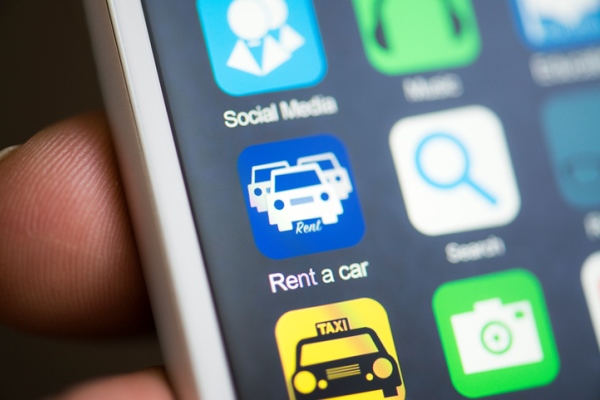Imagine this: you’re standing at the rental car counter with a long line behind you. You got a great rate on a car for the week, and you’re ready to go on vacation with the family. Then, you’re handed a clipboard with an intimidating rental car contract filled with confusing insurance options. Suddenly, you wish you’d spent less time packing and more time researching rental car insurance.
Since rental car insurance isn’t something most of us deal with on a daily basis, it’s easy to get confused or overwhelmed when presented with a choice for this type of coverage.
Continue reading to learn some basic facts about rental car insurance and whether you’ll need extra coverage beyond your personal auto insurance policy.
What Is Rental Car Insurance?
This coverage is not to be confused with rental reimbursement coverage, which is an add-on to your auto insurance policy that provides reimbursement for fees associated with a rental car in the event your own car is being repaired due to a covered loss or accident.
When it comes to the company you rent a vehicle from, car sharing platforms like Turo are handled differently than conventional rental car companies.
Coverage specifics for car sharing platforms vary by state. Before you decline coverage, be sure to check your policy or reach out to us to verify how your policy applies.
Do I Need Rental Car Insurance?
How To Tell If You Need Rental Car Insurance Coverage
If you’re renting a car in the U.S. of similar value to your personal car, it is likely that your auto insurance coverage will be adequate for the rental. But if you’re off to a blowout beach weekend in a slick set of wheels like a sports car and you’re leaving your 2008 family sedanat home, purchasing the extra auto insurance coverage offered by the rental company may be a good idea.
Does Car Insurance Cover Rental Cars?
Do You Need Car Insurance to Rent a Car?
Does My Credit Card Provide Rental Car Insurance?
The two main types of coverage are primary and secondary. Primary coverage handles damages to the rental car regardless of other insurances, while secondary coverage only kicks in after your other polices, such as your personal auto policy.
Both types usually cover rental vehicle damage, not liability. Make sure you have proper liability protection elsewhere. To ensure the details of your card’s benefits and coverage, reach out to your credit card company when using it for payment.
 What Is Covered Under A Typical Rental Car Insurance Policy?
What Is Covered Under A Typical Rental Car Insurance Policy?
Rental car insurance is usually broken out into the following coverages:
- Liability coverage
- Personal accident insurance
- Collision Damage Waiver (CDW)/Loss Damage Waiver
- Personal Effects Coverage
Insurance You May Have Already
Comprehensive Coverage
Comprehensive coverage helps cover the cost associated with non-collision-related damages to your vehicle, such as vandalism, theft, or weather.
Collision Coverage
Collision coverage helps cover the repair expense for your vehicle in case of an accident with another car or object.
This coverage typically extends to vehicles you rent and may negate the need to accept the Collision Damage Waiver (CDW) coverage from the rental car company. You should consider additional factors, such as the deductibles you carry for each of these coverages. See further for more details on Collision Damage Waivers.
Liability Coverage
Liability coverages, such as property damage and bodily injury, are a basic component of most car insurance policies. If you have adequate liability coverage on your own vehicle (check with your insurance provider), you may choose to skip this one.
First Party Medical
First party medical coverages may pay your medical bills and lost wages if you’re injured in an accident.. As long as you have Personal Injury Protection or medical payments coverage on your auto policy and reliable health insurance, you may not need this coverage. It’s also a good idea to review any limits or deductibles related to these coverages before you decide.
Rental Car Coverages You Might Need
Collision Damage Waiver (CDW)/Loss Damage Waiver
This is not an insurance product, but rather a waiver that transfers financial responsibility from you to the rental car company in case of damage or theft. In most cases, collision damage waivers also provide coverage for “loss of use” if the rental car company charges for the time a damaged car cannot be used because it is being repaired.
Personal Effects Coverage
Having a homeowners, renters or condo policy usually extends coverage for your personal items, even if they are stolen from a rental car. It’s important to be aware that the coverage kicks in only after any applicable deductible is met. Consider the value of the items you will be taking with you. If the cost to replace them is below your deductible, your policy won’t provide coverage.
Should I Get Rental Car Insurance?
Picture this: you’ve just landed in a sun-soaked paradise, collected your rental car keys, and you’re cruising with the windows down, soaking in the vibes. But then — an unexpected collision. While we’re not in the business of painting gloomy pictures, it’s essential to be prepared for every turn in the journey. If your current auto insurance policy doesn’t cover your rental, it might be wise to gear up with some additional coverage to protect your trip. On the flip side, if your personal policy has got your back, you might be good to go. Quickly reviewing your coverage details before hitting the road can guide you to a more informed decision.
Next steps: To learn more about your policy and rental car insurance, call us at 1-800-841-0728 or review your policy documents on geico.com. Or, if you’re looking for a new auto policy, compare car insurance and see why GEICO is the right choice.










Loretta Sloan says,
Thank you for clarifying and helping us your customers with doubts that were unanswered
Andrea W. says,
I have comprehensive and liability coverage on my personal car. Every time I’m presented with insurance at an airport car rental I get slammed with very expensive insurance that seems to cover just about everything I don’t need. Because of the outrageous cost, I usually refuse the additional coverage. How do I get only Collision Damage Waiver (CDW)/Loss Damage Waiver? Is it possible to just get that and not the rest?
Anthony F DeStefano says,
Why not add a notation on the Insurance ID card if we are covered for rentals
Barbara Archer says,
I already did!!
Thomas says,
These articles always seen to be missing the most important part “loss of use” in a scenario you are in an accident the rental car companies state that no insurance covers loss of use. I don’t believe this is necessarily true but this always goes unmentioned in articles like these
LOUIS EVANGELISTA says,
THIS IS A VEERY CONFUSING ANSWER: “Collision Damage Waiver (CDW)/Loss Damage Waiver. This is not an insurance product, but rather a waiver that transfers financial responsibility from you to the rental car company in case of damage or theft. In most cases, waivers also provide coverage for “loss of use” if the rental car company charges for the time a damaged car can not be used because it is being repaired.” THIS SEEMS TO SAY THAT ONE SHOULD GET THIS COVERAGE FROM THE RENTAL CAR COMPANY SINCE IT IS NOT COVERED IN ONE’S AUTO INSURANCE POLICY. I’VE DONE USUALLY SO BUT HAVE FELT FLEECED.
Rob C. says,
Some years ago I worked for a rental car company. On a Saturday a women brought back a car that was damaged. I had to drive the car to the body shop to be repaired. The cause of the damage was negligence. About a week later I had to go to the body shop with a check for the repair. The repair cost was $4,200. The lady had purchased the waiver, and payed nothing for the damage. If you say “that’s ok, I have insurance” and decline that’s fine, just remember if you have a problem without the waiver, you will pay your policy deductible AND your rate may go up as a result. Yes, those are the gravy profits for the rental company. I always buy the waiver now whenever I rent a car.
jose colon says,
Loved your Geico living articles, great info.
David Porter says,
Is “loss of use” coverage available as an add-on to my Geico policy? I rent cars once or twice per year and “loss of use” is the only thing I’m concerned about. The cost of the CDW is usually huge and is usually a rip-off…and “loss of use” is ill-defined. Does that mean that the rental car company can charge you the rack-rate rental charge for every day the car is in the shop, even though they may not have rented that car during the period anyway? Would they only charge you for the loss of potential profit or for all their corporate overhead which they’d have to pay anyway no matter whether the car is rented out of not. What is industry practice on these issues?
Jacqueline Arnold says,
Great Information & put out simply to understand
Thank you!!!!
reynaldo pagtakhan says,
I do not need rental car insurance,thanks..
Richmond Ellis says,
Real good information,did not know some of it.
Greg Belcamino says,
Beware of scams if you are in an accident damaging a rental car. I hit an elk in a rental car in Montana. I paid my deductible, and my policy covered damage to the vehicle. I then received a call from a different company retained by the rental company claiming I owed an additional $2500 because the rental’s resale value had been diminished as a result of the stigma of having been involved in the accident, even though the car had been repaired. They claimed that there was a Montana Supreme Court case that permitted this. I’m a lawyer, and asked them to send me the case. It was completely inapplicable; they must have thought I was lying about having a law degree. After about 3 months of harassing phone calls, they offered to take $250 to “get this off their books.” After I stopped responding, they finally went away. I guess I could have avoided this by purchasing the extra coverage, but it was a lot easier to just say “no.”
Audrey Gilbreath says,
VERY HELPFUL I DIDN’T KNOW SOME OF THE THINGS ABOUT RENTAL.
David Marr says,
Collision Damage Waiver (CDW)/Loss Damage Waiver. This is not an insurance product, but rather a waiver that transfers financial responsibility from you to the rental car company in case of damage or theft.
Does this mean “Collision Coverage” ?
ision” coverage ?
Valerie Robinson says,
This insurance transfers financial responsibility from you to the rental company
Frank Casanova says,
That was already outlined in the article… However, there was no commentary or advice as whether or not to accept this waiver.